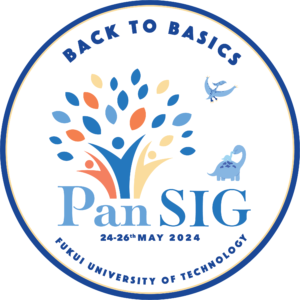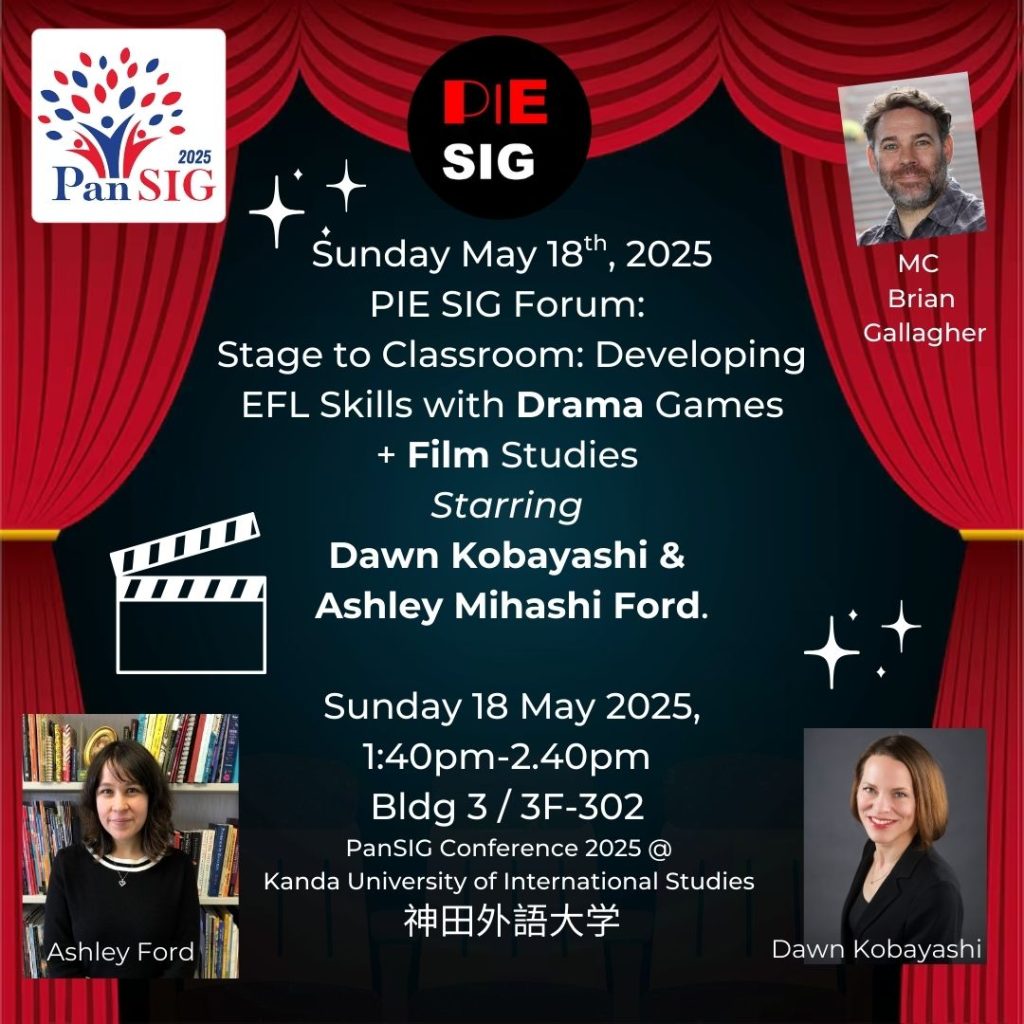Events
- PIE SIG @ PanSIG
- Sapporo 2025 PIE Conference Program and ScheduleThe 4th Annual PIE SIG in Sapporo Conference will be held Saturday, 15 February to Sunday, 16 February 2025. The Japanese Association for Language Teaching’s Performance in Education Special Interest Group (JALT PIE SIG) will be holding a two-day, face-to-face conference along with JALT’s Hokkaido Chapter. Saturday, 15 February, is exclusively for Performance in Education… Continue reading Sapporo 2025 PIE Conference Program and Schedule
- Fourth Annual PIE SIG in Sapporo Conference Performance in Education: Tools for Your Toolbox Fourth Annual PIE SIG in Sapporo Conference: Performance in Education: Tools for Your Toolbox Date: (Saturday, Feb 15, 2025) Site: The PIE conference will be held Saturday, February 15th at the SCARTS Sapporo Cultural Arts Community Center Theme: Performance in Education: Tools for Your Toolbox Call for PapersAll PIE SIG-related proposals for this face-to-face conference need… Continue reading Fourth Annual PIE SIG in Sapporo Conference
- 2nd Annual PIE-in-Nagoya Conference, with the Nagoya and Gifu Chapter of JALT2nd Annual PIE-in-Nagoya Conference, with the Nagoya and Gifu Chapter of JALT Performance in Education activities can be special presents for our students to help them celebrate any occasion, be it a holiday or the end of a unit. Help us prepare to belatedly commemorate Halloween, Thanksgiving, Christmas, New Year’s . . . or even… Continue reading 2nd Annual PIE-in-Nagoya Conference, with the Nagoya and Gifu Chapter of JALT
- PIE SIG Summer Conference 20242nd Annual PIE-on-Lake-Nojiri Conference Description JALT PIE SIG, with cooperation and support from the Okinawa Chapter of JALT, the Niigata Chapter of JALT, and JALT CALL SIG, and with assistance from the Teaching Young Learners and the Nagano Chapter of JALT, are proud to sponsor the PIE SIG Summer Conference 2024, to be held 23-25 August… Continue reading PIE SIG Summer Conference 2024
- PIE SIG at PanSIG 2024PIE SIG participated in JALT’s PanSIG 2024 at Fukui University of Technology from 24-26 May 2024. PIE SIG events were held on Friday and Saturday evening. Presentations were 6 minutes each, with an extended presentation for Brian Gallagher to show a student film. On Saturday, 25 may, we held performances in the afternoon and then… Continue reading PIE SIG at PanSIG 2024
- PIE SIG 2024 ConferencesSpring Conference – Summer Conference – Autumn Conference PIE SIG Spring Conference 2nd Annual FREE-PIE-on-Zoom Conference: Recipes for PIE 2 2024 Site: Zoom (link to be provided later)Theme: Recipes for PIE 2Date: February 2025(TBA): Practice for presenters on Zoom Click here for Call for Submissions Click here for Registration Click here for the Schedule Description This conference… Continue reading PIE SIG 2024 Conferences
- 9th IAPL ConferenceThe International Association of Performing Language will be hosting the 9th International Association for Performing Language Conference from 12-13 October 2024. The conference will be held and, and will be co-hosted by, the Hyogo Professional College of Arts and Culture. The Call for Papers, Presentations, and Workshops is open until 30 June 2024. More information,… Continue reading 9th IAPL Conference
- PIE SIG Winter Zoom Conference ScheduleThe PIE SIG Winter Zoom Conference will be held on Saturday, March 16, 2024, from 09:00 to 18:00. The conference theme is Recipes for PIE: MY PIE Activity. If you would like to register to present at the Winter Zoom Conference, please click here to go to our Call for Papers. If you would like… Continue reading PIE SIG Winter Zoom Conference Schedule
- Call for Papers: PIE SIG Winter Zoom My Activity Conference (March 16, 2024)The Performance in Education Special Interest Group (PIE SIG) will host a free, one-day Zoom conference. We welcome anyone interested in demonstrating various learning activities to submit an application through our Call for Papers by clicking here. All presentations will be 25 minutes long and should be a Performance in Education activity that can be… Continue reading Call for Papers: PIE SIG Winter Zoom My Activity Conference (March 16, 2024)
- Upcoming 2023 PIE SIG ConferencesSummer Conference(Lake Nojiri, Nagano) Autumn Conference(20-22 October 2023, Nagoya) Winter Conference(Zoom) SUMMER CONFERENCE Description — Site — Call for Papers — Registration Resources — Schedule — Review Description PIE SIG at Lake Nojiri This is the first PIE SIG Conference in the beautiful resort area of Lake Nojiri in northern Nagano. The site of the 3-day… Continue reading Upcoming 2023 PIE SIG Conferences
- The Annual Performance in Education SIG in Okinawa Conference (March 3-5, 2023) Registration & Call for Papers***Registration for non-presenting attendees can be found by clicking HERE. The conference program and schedule will be available at this link. The Performance in Education SIG is returning to Okinawa for a face-to-face conference in March of 2023. The site of the conference is the beautiful Hotel Mahaina Wellness Resort in Motobu, Okinawa, Japan. The… Continue reading The Annual Performance in Education SIG in Okinawa Conference (March 3-5, 2023) Registration & Call for Papers
- Third Annual PIE SIG in Sapporo Conference (Feb 4-5, 2023) Call for Papers & Registration***Registration for non-presenting attendees can be found by clicking HERE. The conference program and schedule will be available at this link. The Third Annual PIE SIG in Sapporo Conference will be held in Sapporo, Japan from February 4th-5th, 2023. This face-to-face conference will be held during the Sapporo Snow Festival (unless the festival is canceled due to… Continue reading Third Annual PIE SIG in Sapporo Conference (Feb 4-5, 2023) Call for Papers & Registration
- The 4th Performance in Education: Research & Practice PIE SIG in Gero (Gifu) Conference (January 14-15, 2023)The 4th Performance in Education: Research & Practice Conference, originally scheduled for July 30-31, 2022 but postponed due to the COVID-19 situation, has been rescheduled to January 14-15, 2023. The Conference will be held in the famous mountain hot spring town of Gero in Gifu prefecture. The site of the conference is the wonderfully designed… Continue reading The 4th Performance in Education: Research & Practice PIE SIG in Gero (Gifu) Conference (January 14-15, 2023)
- JALT PIE SIG Forum 2022Please click here for the Zoom link
- Status of 4th PIE ConferenceDear Colleague, News this morning is that Nagoya is experiencing its highest number of COVID cases in the pandemic. The increasing numbers of cases also depressed conference attendance. We will be postponing the full conference until later this year. Instead of the full conference planned, some speakers and attendees requested a reduced FREE ONLINE conference… Continue reading Status of 4th PIE Conference
- Call & Registration: 4th Performance in Education: Research & Practice Conference/Student Showcase/Film Festival4th PIE Conference (July 29-31) Information The Performance in Education Special Interest Group (PIE SIG) and the Okinawa chapter of the Japan Association for Language Teaching (JALT) invite presenters and attendees to join us at the 4th Performance in Education: Research & Practice Conference/Student Showcase/Film Festival (4th PIE). Conference Location and Mode 4th PIE will… Continue reading Call & Registration: 4th Performance in Education: Research & Practice Conference/Student Showcase/Film Festival
- The Third Performance in Education: Research & Practice ConferenceThe Third Performance in Education: Research & Practice Conference with Student Showcase, Film Festival, & Performances Hey PIE scholars, check it out! These outstanding researchers will be digging deeper into theory and how performance activities lead to successful learning this coming Saturday, September 18th, at the Performance in Education: Research and Practice ONLINE Conference. Scene… Continue reading The Third Performance in Education: Research & Practice Conference
The Performance In Education SIG of the Japan Association for Language Teaching (JALT) sponsors several conferences a year, usually in convenient and interesting locations, with workshops, presentations, and performances. Families are always welcome.
“We are always trying to grow and spread our message through collaboration with YOU.”
What draws many people to the PIE SIG are the amazing and effective activities described by SIG members, the creative talents of the teachers/performers, and most of all, the warm, friendly atmosphere that we work hard to create. We are useful and FUN.
Want to collaborate with us? Contact us at jaltpiesig@gmail.com if you are in the collaborative mood or come and see for yourself what we are about at our annual Performance in Education Research & Practice Conference.





